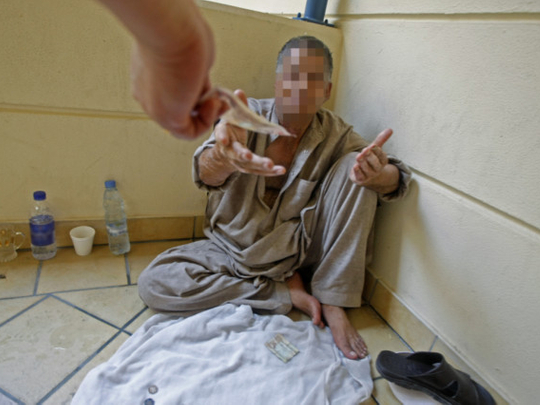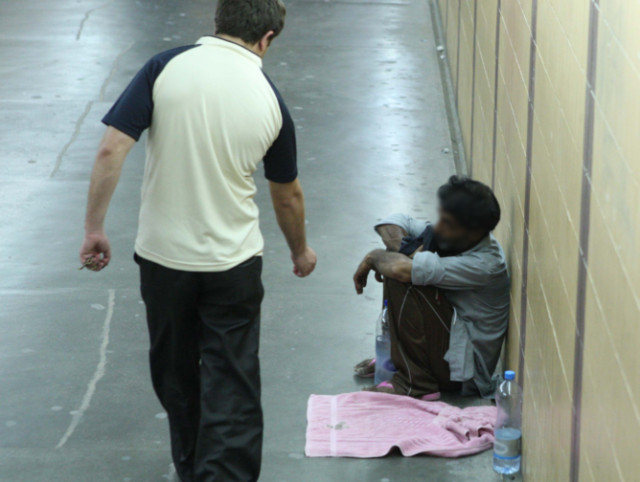
Dubai: Mohammad Amjad, 41, reckons he could break even by the first week of Ramadan. But that’s assuming his handlers don’t move him elsewhere.
We are standing in a parking lot near Mamzar Corniche. It’s close to midnight and Amjad is winding up. “In two days I managed to collect Dh1,200 here. I am not sure what it would be like at the next location they assign me,” he says.
Amjad is among scores of professional beggars who’ve air-dashed to the UAE from India and Pakistan to cash in on the generosity that typifies Ramadan, a month when the multi-million dirham begging industry goes into overdrive in the UAE.
Amjad’s trip hasn’t come cheap. The ‘opportunity’ cost him Rs75,000 (Dh4,600), paid in advance to an agent in his native India. Another seasonal beggar, Mustafa, 55, said he forked out Rs100,000 (Dh3,600). His agent is based in Lahore, Pakistan.
Linked to large criminal syndicates, the agents not only arrange air tickets, visas and accommodation but, in some instances, even plan the itinerary of their ‘clients’, much like tour operators.
“They decide the spots where we are to be deployed and for how long. I’ve three days here, then somebody else will take my place,” says Amjad, who landed in the UAE from the Indian state of Bihar early this month.
In Sharjah a beggar from Pakistan told this undercover journalist why he chose to spend Ramadan away from his family.
“I’ve to marry off my daughters. I borrowed Rs100,000 to come here as I was told they give charity here. The agent took Rs60,000...they are butchers who cut the throats of poor people.”
The entire conversation was caught with a hidden camera and can be viewed at www.xpress4me.com.
But other beggars are discreet and don’t let their pretence drop.
“How do we know you’ve not flown in here to exploit charitable sentiments during Ramadan?” we asked a well-groomed middle-aged man seeking alms in Sharjah’s Al Tawuun area.
“May the ground beneath my feet cave in if I am lying. I’ve been living in Dubai for over 10 years. But I lost my job and am desperate. Help me, please,” he implored.
Take five
To check if he was indeed a resident we asked him to name any five Dubai localities. For a while, the man beat around the bush and tried to change the subject. Eventually, he said: “Look, there is airport area, that’s one, then there is Bur Dubai. That’s two, and then there are three other areas. Now, could you please let me go? I am in a hurry.”
In front of Spinneys on Sharjah’s King Faisal Street another suave gentlemen (see far right), carrying a BlackBerry phone and wearing a fancy watch uses a similar ruse. “I live in Buteena with my family. I’ve lost my job and need money. I have small children,” he pleads, but shrugs off requests to show identification papers.
A request to visit his house is also ignored. He is also on video.
Begging is outlawed in the UAE. Residents are repeatedly urged to discourage alms-seekers and report them to authorities. As many as 20 police patrols have been deployed in the city this Ramadan as part of Dubai Police’s annual anti-begging campaign. Similar campaigns have also been rolled out in Abu Dhabi and Sharjah.
They have been fairly effective. In Dubai 29 beggars including many women have been arrested since July 10 when Ramadan began. All of them had entered the UAE on visit visas.
In 2012, nearly 650 beggars were arrested in Dubai, one third of them during Ramadan. Among them was a man who asked passersby to contribute Dh10 for his bus fare. By the time he was nabbed, he had made Dh19,000. His counterpart in Sharjah did better, collecting Dh30,000 in a matter of days.
A beggar was caught faking a disability with a prosthetic leg and another con artist was netted feigning illness through an IV bag taped to his abdomen. When police checked the bag’s contents it turned out to be an ordinary yellow liquid. Yet there were many who got away. Last Ramadan a vengeful beggar superglued an Indian woman’s car doors after she turned him away.
She remained locked out of her SUV for nearly two hours before attendants from a gas station were called to prise open the jammed doors with special tools.
Rounding up beggars is like trying to fill a leaking vase because the sub-continent is not the only place they come from. Many sneak in from neighbouring countries.
An example is an Arab woman caught begging in Dubai recently. When she was interrogated it came to light that she had been arrested five times but each time managed to slip in using forged documents. A few years ago, Dubai Police busted an elaborate begging syndicate run by a Yemeni who used his car to pick up and drop off mendicants and take a share of their collections.
Transfer receipts to his bank in Yemen showed he had sent over Dh46,000 in one month. Among sub-continent beggars, however, illegal hawala transactions are the preferred method to remit money.
The question is that despite such overwhelming evidence, why do people still entertain professional beggars?
A Sharjah-based Islamic scholar offers an explanation. “Muslims become charitable in Ramadan, which is good, but rather than seek out authorised charities, they give money to beggars as they are always around during this time. Near mosques, shopping malls, subways, parking lots – almost everywhere. Another reason is that people are more likely to relate to the plight of a persistent human being than a donation box. Even if they have doubts, they don’t cross-check because they think they have done their bit of good by donating money. This is not right,” he said.
Brigadier Mohammad Nasir Abdul Razaq, Deputy Director of the Criminal Investigation Department (CID), Dubai Police, said beggars routinely lie about needing money and have turned alms-seeking into a lucrative occupation. “People should give money to authorised charities only,” he said, adding that a Dh5,000 fine will be slapped on anyone sponsoring the visas of beggars.
Mohammad Abdullah Alhaj Al Zarouni, manager of the Red Crescent, Dubai told XPRESS that people should not believe the sob stories no matter how convincing they sound.
“Please don’t give them money. This will encourage them. If you really want to help someone who is genuinely in need, give him the address of the Red Crescent or one of the many charitable institutions in Dubai,” he said.
The Red Crescent has nine branches in the UAE. Dubai’s Red Crescent helps 4,000 families. “Our doors are open to everyone. However, we follow a process. We check documents and conduct home visits to validate claims,” said Al Zarouni.
Their message is clear: Beware of the tug at your heart strings; it’s your purse strings that are being tugged.
With inputs from Jay B. Hilotin, Chief Reporter














